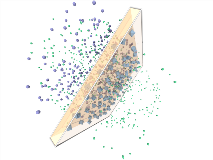


Gas membrane-based separation is considered as one of the furthermost effective technology to address energy efficiency and large footprint challenges. Various classes of advanced materials such as metal–organic frameworks (MOFs) were attempted as membranes for gas separation. MOFs, among other porous materials, possess uniquely tunable nature, in which the pore size and environment can be controlled by connecting metal ions (or metal ion clusters) with organic linkers with various functionalities. This feature makes them attractive for thin membrane fabrication, as both diffusion and solubility components of permeability can be altered. In addition to MOF pure membranes, MOFs can be used as a filler in mixed-matrix membranes (MMMs), which are regarded as promising candidates for energy-efficient natural gas purification.
Related
Publications